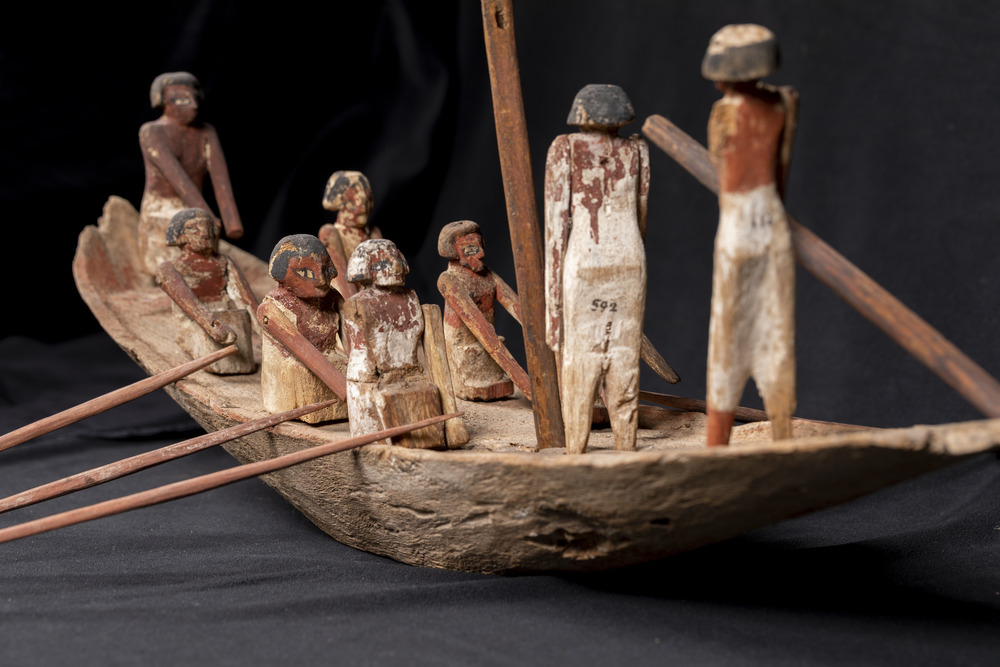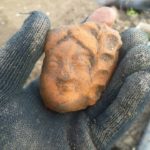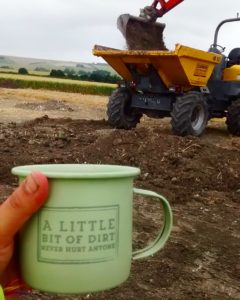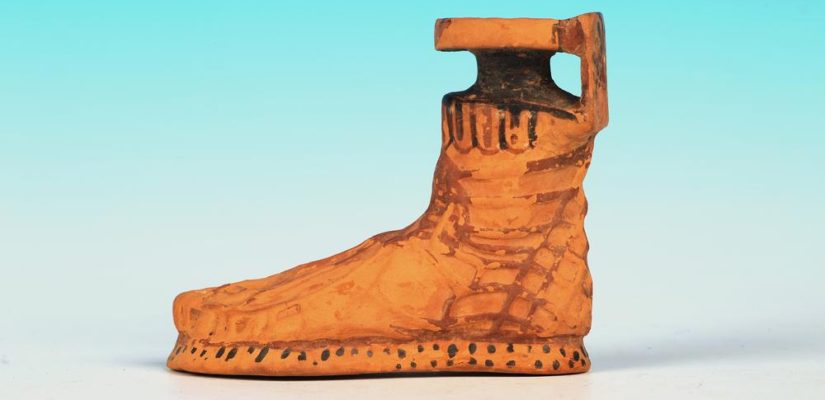
WHAT’S IT LIKE? Episode 5: Prof. Amy Smith – A Specialist in Art History, Ancient Greek Ceramics & Classical Antiquities.
Interviewee: Prof. Amy Smith. Interviewer: Bunny Waring.
Date: 18th June 2021
Welcome to the mini-series called What’s it Like? Originating from my work with the Classics Department, University of Reading, these episodes include interviews of staff, volunteers and students from across the globe, who specialise in all the different fields of academic and commercial studies in Classics, Archaeology and Museums. Candidly sharing the realities of their jobs and historic passions, whether you want to be a Linguist, Museum Curator, Archaeologist, Lecturer, Well Travelled Researcher, A Barrier-Breaker or you’re just here with a coffee – you’re in the right place for inspiration! Read on!
This week: Prof. Amy Smith
A Specialist in Art History, Ancient Greek Ceramics & Classical Antiquities.
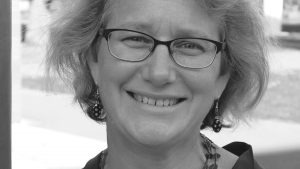 Name: Prof. Amy Smith.
Name: Prof. Amy Smith.
Area of Specialism: I am a classical archaeologist, with a particular interest in: ancient Greek ceramics; ancient iconography; digital classics; ancient religion & politics; museology; reception of Classical antiquities.
Topics of Interest: All of the above, plus female goddesses (esp. Athena, Aphrodite), heroes (esp. Herakles); red-figure painters (esp. the Pan Painter); sensory archaeology (esp. music); materiality.
Job Title: Professor of Classical Archaeology; Joint Head of the Department of Classics; Curator of the Ure Museum.
Job Responsibilities:
Professor of Classical Archaeology: Teach and research Classical archaeology & related subjects (e.g. ancient Greek language, Greek history); encourage, recruit (i.e. find funding for) & supervise postdocs (currently Signe Barfoed, on a Norwegian Research Council Grant) & PhD students. I get a two new PhD students next year, namely Summer Courts, working on ‘The Archaeology of Hidden Identity’ & Caitlin Laurence, working on ‘Statistical and Digital analysis of 6th-4th c. BC Attic pottery found in Anatolia’; engage with the worldwide community of scholars incl. external examining undergrads (currently at KCL) & postgrads (currently external examiner to Leeds PhD); serving on advisory boards & committees (e.g. editorial board for New Classicists & Claros); outreach to schools & other national audiences); & much else!
Joint Head of Department: I share this job with Barbara Goff (which is a godsend) because both of us have other big administrative jobs that we can’t really get rid of—she’s Departmental Director of Teaching & Learning; I’m Curator of the Ure; we divided it along lines that fit with those roles. So while she does the student-facing things I do the outreach & research, incl. postgraduates for the most part. That entails amongst other things organising and hosting our department’s online research seminars, which we’re now (with the speakers’ permission) beginning to share on our Department’s YouTube account. This term I’ve been working with marketing partners on devising a new department website: fun finding pictures & stories but challenging like so many such projects that come from ‘above’ because fitting into the dreaded ‘template’ stifles our creativity.
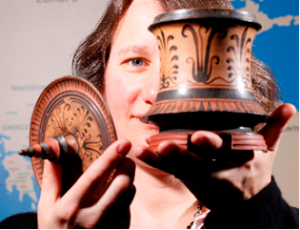 Curator of the Ure Museum: Of all of my jobs this is the one that is most variable from day to day, week to week, year to year. I’ve been doing it for nearly 21 years now, during which time we’ve had major analogue and digital projects, like redesigning the Ure’s learning environment (i.e. restyling the place) in 2004-5, creating our own bespoke database (https://uremuseum.org/cgi-bin/ure/uredb.cgi), redesigning (twice) & maintaining our museum website, temporary exhibitions, e.g. our upcoming Spotlight Loan from the British Museum: ‘Troy: Beauty and Heroism’ (21 September-12 December 2021; already twice postponed!). Normal day-to-day stuff includes answering scholarly requests about visiting, studying & using our artefacts & archives for research; representing the Ure Museum at network meetings, conferences, etc.; supervising & supporting but not line-managing two part-time members of staff—Jayne Holly (Assistant Curator) & Claudina Romero Mayorga (Education Officer)—and with them recruiting & supervising (& seeking funding for) interns, volunteers, & other helpers; chivvying members of the department staff to help us out from time to time; seeking small and large pots of money to do pretty much everything; and running our own research activities including seminars etc. We have no internal funding, except for staff, & no external funding unless we go out & find it, so everything is on a shoestring, which means we’re very good at putting interns & volunteers to good use (e.g. on our Museum in a box projects & a forthcoming lesson in a box on democracy with Study Higher).
Curator of the Ure Museum: Of all of my jobs this is the one that is most variable from day to day, week to week, year to year. I’ve been doing it for nearly 21 years now, during which time we’ve had major analogue and digital projects, like redesigning the Ure’s learning environment (i.e. restyling the place) in 2004-5, creating our own bespoke database (https://uremuseum.org/cgi-bin/ure/uredb.cgi), redesigning (twice) & maintaining our museum website, temporary exhibitions, e.g. our upcoming Spotlight Loan from the British Museum: ‘Troy: Beauty and Heroism’ (21 September-12 December 2021; already twice postponed!). Normal day-to-day stuff includes answering scholarly requests about visiting, studying & using our artefacts & archives for research; representing the Ure Museum at network meetings, conferences, etc.; supervising & supporting but not line-managing two part-time members of staff—Jayne Holly (Assistant Curator) & Claudina Romero Mayorga (Education Officer)—and with them recruiting & supervising (& seeking funding for) interns, volunteers, & other helpers; chivvying members of the department staff to help us out from time to time; seeking small and large pots of money to do pretty much everything; and running our own research activities including seminars etc. We have no internal funding, except for staff, & no external funding unless we go out & find it, so everything is on a shoestring, which means we’re very good at putting interns & volunteers to good use (e.g. on our Museum in a box projects & a forthcoming lesson in a box on democracy with Study Higher).
Introduction
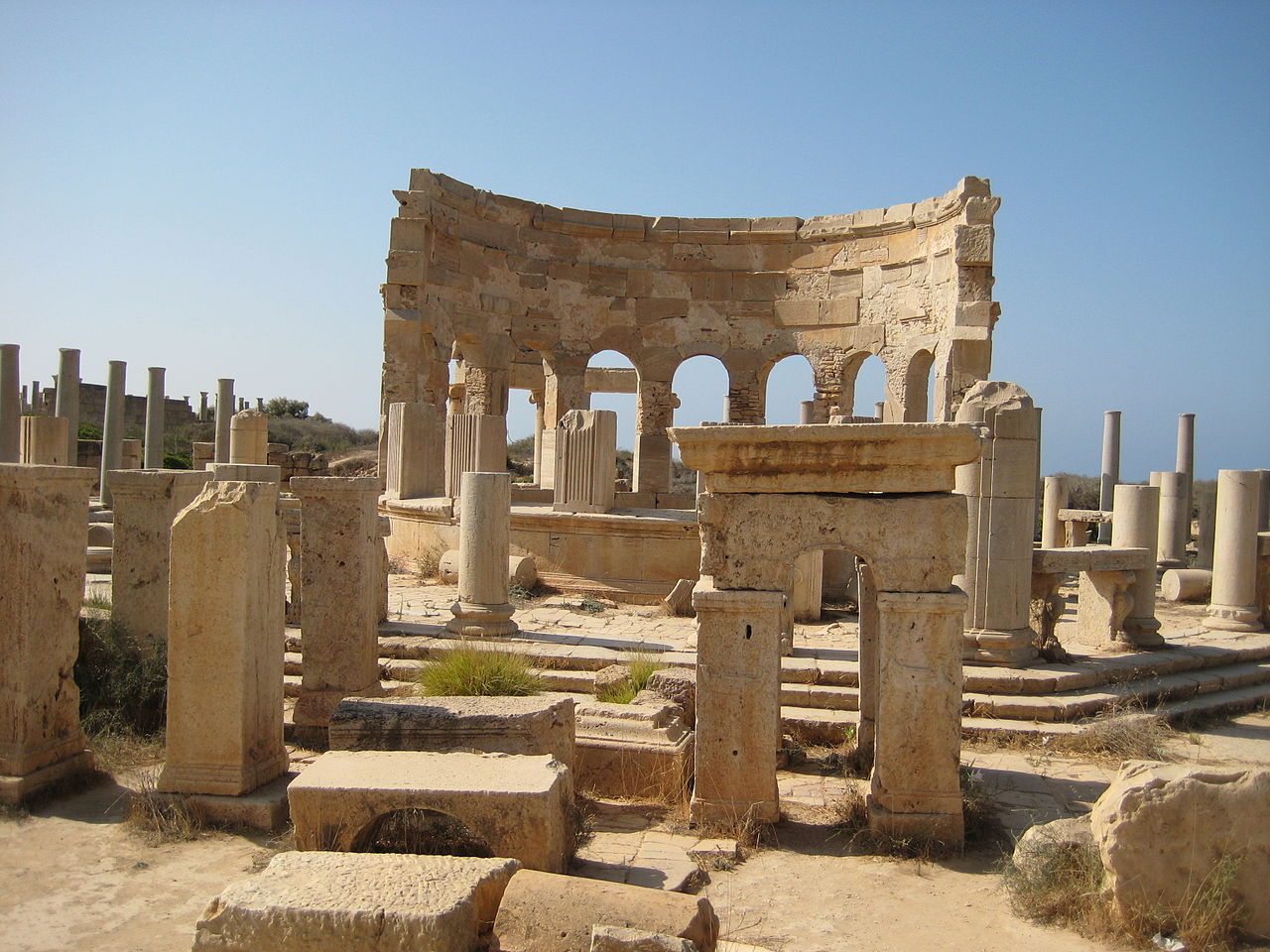
I was born in Libya & my dad took credit for my becoming an archaeologist because he took my mum to Leptis Magna when she was pregnant. I think it more likely that my childhood in London inspired me: museums were free, we lived near them, & I ducked into them when it was raining! My English teacher in preparatory school loved the painter J.M.W. Turner so she developed my art historical interests, while my history teacher in secondary school told us all about Minoan civilisations! Shortly after that, I visited Corfu, which I still remember as my favourite childhood holiday (I was already a Gerald Durrell fan). Archaeology finally won out in university when I was lucky enough to be taught Greek mythology by a bronze age archaeologist (Jerry Rutter at Dartmouth). Before I pursued postgraduate studies at Yale, I took a detour into publishing & after a few years as Assistant Editor of the American Journal of Archaeology (a brilliant opportunity, and fun to live in Boston) I realised that I enjoyed the content of the articles slightly more than fiddling with the layout, proofreading etc. At Yale I got to work with Curator Susan Matheson at the Yale Art Gallery & was torn whether to pursue a university or museum career. So when Reading interviewed me in the Ure Museum I jumped at the chance to combine both.
I am very lucky to have a job doing lots of things I love: teaching, helping younger people develop skills, both in the classroom & in the museum, research & much else. Being an archaeologist I am genuinely interdisciplinary: (1) I like how a combination of sources—material culture, ancient texts, scientific analysis, etc.—help us piece it all together; (2) I don’t have to restrict myself to one time period, culture group, or place, because of course cultures have always bumped shoulders with each other and (3) the more I study antiquity the more I realise the importance of intellectual history, that is, understanding how and why our society has inherited perspectives gained from other cultures & societies that have responded to the ‘Classics’ since antiquity
What is your daily life really like?
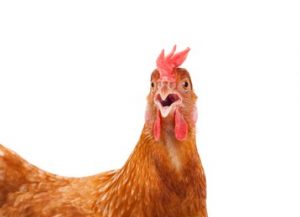 Working from home during lockdown gives me more of a pattern than I used to have, but either way, I tend to wake up early, take a swim or a run or both, eat a big breakfast (I keep chickens!) and then settle down to my laptop, reading, answering and/or deleting the tonnes of emails I receive. This is all interspersed with meetings & classes in term time, checking my schedule for upcoming deadlines for grant applications, presentations or papers I’ve promised to give, references I need to write, teaching sessions to prepare and the associated marking. Summer term, which is never-ending in times of COVID19, is dominated by marking. If the sun is shining, I might try to take a midday break in the garden or take a walk/cycle ride to an errand, just to get me out of the house. For research, (that I prefer to do in a library), I try to block off time either a whole day or at least a whole afternoon to let me get in the right mindset, but there’s never enough time for research, especially during term time. If I’m doing research or writing at home sometimes a quiet evening might give me the chance to focus without noticing the time passing. I’m a big multitasker so I might cook at the same time (I’m a firm believer in slow cooking, including sourdough bread). Now that we’re allowed into the Oxford libraries again I’m booking as much time as I can—including weekends—to research there.
Working from home during lockdown gives me more of a pattern than I used to have, but either way, I tend to wake up early, take a swim or a run or both, eat a big breakfast (I keep chickens!) and then settle down to my laptop, reading, answering and/or deleting the tonnes of emails I receive. This is all interspersed with meetings & classes in term time, checking my schedule for upcoming deadlines for grant applications, presentations or papers I’ve promised to give, references I need to write, teaching sessions to prepare and the associated marking. Summer term, which is never-ending in times of COVID19, is dominated by marking. If the sun is shining, I might try to take a midday break in the garden or take a walk/cycle ride to an errand, just to get me out of the house. For research, (that I prefer to do in a library), I try to block off time either a whole day or at least a whole afternoon to let me get in the right mindset, but there’s never enough time for research, especially during term time. If I’m doing research or writing at home sometimes a quiet evening might give me the chance to focus without noticing the time passing. I’m a big multitasker so I might cook at the same time (I’m a firm believer in slow cooking, including sourdough bread). Now that we’re allowed into the Oxford libraries again I’m booking as much time as I can—including weekends—to research there.
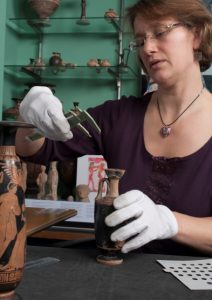 The Museum work is interspersed throughout my Professor work and often indistinguishable from it, visavis research. A lot of people both within & beyond the University treat me like I’m either Curator or Professor or Head of Department or even web editor, i.e. like I’ve only got one job! Since the first lockdown, I’ve had had weekly meetings with my Ure colleagues so that we can touch base with each other on our many initiatives & what the various interns/volunteers are doing with/for us. In many ways, my curatorial work is my most important ‘teaching’. I’m very proud of the huge number of assistant curators, interns & volunteers we’ve had in the Ure over the years: some have gone on to get their MAs or PhDs & become successful curators or other museum professionals, teachers, lecturers, researchers, editors, filmmakers. I’m just as proud of the others who have developed skills from time spent in museums & academia, such as event planning and marketing.
The Museum work is interspersed throughout my Professor work and often indistinguishable from it, visavis research. A lot of people both within & beyond the University treat me like I’m either Curator or Professor or Head of Department or even web editor, i.e. like I’ve only got one job! Since the first lockdown, I’ve had had weekly meetings with my Ure colleagues so that we can touch base with each other on our many initiatives & what the various interns/volunteers are doing with/for us. In many ways, my curatorial work is my most important ‘teaching’. I’m very proud of the huge number of assistant curators, interns & volunteers we’ve had in the Ure over the years: some have gone on to get their MAs or PhDs & become successful curators or other museum professionals, teachers, lecturers, researchers, editors, filmmakers. I’m just as proud of the others who have developed skills from time spent in museums & academia, such as event planning and marketing.
What is the best part of your job?
The best thing about my job is that no two days or weeks or years are the same: I have worked in lots of different & very wonderful places, with amazing & interesting people. I have flexibility with my schedule, although—especially nowadays—our work is never done (and this is the worst part). Like most academics, I do maybe an average of 1.5 x more hours than my employers think.
Why do you think your specialism is important?
My work is important for 3 big reasons.
(1) Teaching, (i.e. helping young people learn about their world & how they might contribute to it), is an essential thing & a great privilege.
(2) We need to learn from the past! Archaeology helps us fill in the gaps provided by the biased texts, giving us perhaps a more honest glimpse at real people. To be fair, as an art historical archaeologist I tend to look at the stuff that richer people used, yet it still helps everyone to understand how it has been used, seen & understood by humble people too.
(3) Helping audiences young and old, academic & general to engage with museum content is a brilliant way to bring together teaching, learning about the past, & developing peoples’ interpretative confidence. Anyone can have a good and inspiring interpretation of an artefact that contributes to our understanding of (pre)history. In these three ways, I think I can, and do, make a difference.
If you didn’t have your current job, what else could you apply your skills to?
If you’ve read this far you’ll know that I’ve dabbled in editorial & museum work; I was taught my proofreading skills when I worked as a paralegal intern! So I’m sure I could apply myself to all of those tasks, ‘tho my best friend in high school & I dreamed of opening a bakery, & I sometimes think that I might enjoy running a pub or café on the river.
Did you always want to be what you are today?
No, only since I watched Indiana Jones (Raiders of the Lost Ark). Actually, that film gave me the excuse to study ‘Classical Archaeology’ as an undergraduate, but throughout that degree, my MA, MPhil & PhD, I just thought I’d push it as far as I could (& as long as I could get funding for my studies—see below). Imagine my surprise when I actually got a job (at Tufts University) & started to think I might actually become a Classical Archaeologist!
Where do you hope to be in 5 years time?
I hope to be a Professor, still at Reading (perfectly situated between London & Oxford, with excellent access to airports), but perhaps not Joint Head of Department anymore. I hope that I’d have had the chance to visit China (I was scheduled to go there in March 2020!) & to take up my Visiting Professorship at University of Queensland (postponed since Autumn 2020) & much more in terms of travel to collections, conferences, etc. If universities go belly up then I’d like to be sailing around the world.
What 3 tips would you give to someone who wants to follow a similar path?
Don’t pursue academia unless you’re doing it for the knowledge & fun; that is, don’t just do it for the career/job because that might not ever happen. So keep your eyes opened for other opportunities & don’t be afraid to jump out of your comfort zone. The best advice (which I’d like to pass on) was from a friend of a friend in the finance office at Boston University. She said ‘don’t bother with a PhD unless you get a fellowship’. The logic, that if you don’t rise to the top of the pile (of students) at that stage then it will be hard for you to rise to the top later in your career, is unfortunately true. That said, whatever you choose to do, put your all into it, make it work, and have fun: your own enjoyment will enthuse others & make everyone (including yourself) enjoy it that much more.
What to know more?
Head over to the Ure Museum for our new exhibition on Troy or read about the fascinating foot sculpture at the top of this article here.
